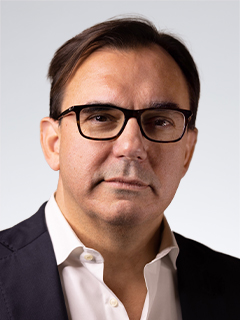Transcript
Joe Farrell: Hello, everybody, and welcome to the future of learning conversations. My name is Joe Farrell. I'm the Managing Director of KPMG Learning Services. With me today from Seattle, Washington is Microsoft's very own Alessandro Giacobbe. He is the General Manager for Microsoft's Enterprise, Learning Practice. Alessandro welcome and thank you for joining us today.
Alessandro Giacobbe: Good afternoon, Joe it is a pleasure to see you and I’m looking forward to the conversation today.
Joe Farrell: Good to be with you as always, Alessandro. You know we talk quite a bit. We speak at conferences, but I recall a conversation we had about 2 years ago and was a conversation around. How do we face the challenge of the largest global workforce transformation in history? And we were discussing that event because it stemmed from COVID-19 crisis that led to a healthcare crisis and economic crisis and a social crisis. The main point of that discussion was that that Covid was going to dissipate over time, and it's actually showing today where it is dissipating over time, and however disruptions in the market and the speed and pace of change in the market is going to become the norm, and I think, from a learning perspective, the outcome of that conversation is really as we engage with our clients, we need to design and build modern learning solutions that can adapt to the constant change globally, and the constant change within the workplace itself. So today, what I’d like to do is kind of step in and take a look at 2023, and some of the challenges that we're going to face in in 2023. I'd like to start off with the big one, the downturn in the market, you know. Some folks are saying there's a downturn right now, and we're experience it. Some folks are saying it’s going to come in early 2023. Some are saying it's going to be short term. Some are saying it's going to be a little longer. But most of all the bottom line is, everybody agrees that we're going to have to do more with less. So, from the learning perspective. Alessandro, you know, what role does learning play in helping us through the challenge of this downturn in the market?
Alessandro Giacobbe: Yeah, thank you for the question. Joe. I think because you and I speak often about these topics there's this realization that no matter what industry you're in what you're able to predict about the future that comes your way becomes less and less. And, in fact, we know, that the pace of which we go from a full economy where it's really hard to hire to an economy where there's an oversupply of talent to choose from, it's just so quick that it is really all about. I think you used the word adapt, and the word respond. It is really about the velocity and the agility to be able to respond. So, I love the way you phrase that you do more with less, which is something we've been thinking a lot about and ultimately that's the definition of productivity, which is the ability to get things done with the resources you're given, and you know it could be that next year it'll be the same resources you had last year. It could be that it's less. It could be that it's more. But the point is that how quickly we get to competency, how quickly we get to productivity, how quickly we get to be able to complete the projects that we are tasked to do to get things done essentially in the context of the job that we have every day that's really the key. And so, learning plays a key role. We hear a lot about rescaling and upscaling. but fundamentally it's even a microcosm of that which is, do I have the resources? Do I have the information? Do I have the skills I need right now to complete the project that I have at hand? Which, if we all do, just means that we'll be able to do more with less resources. So, learning plays a key role, and in the time to competency in the time to productivity, probably more than ever before. And so, the access to information in the context of what I’m trying to get done that becomes even more key, and that gives us the agility and the velocity required to respond to our world that is changing upon us all the time.
Joe Farrell: Yeah, Alessandro 100% agree. One of the things I would say from my perspective, as we assess and call design, the future of learning for our clients is building in the operational efficiency. That kind of will deliver that speed to market. And I think it's a cross pollination of innovative technologies. We need to leverage more along with innovative learning, design, and instructional treatment, and I really think that can reduce down speed to market and assist people that are trying to do more with less by basically giving them what they need when they need it in the flow of work. The next topic, Alessandro, is the great resignation, that we faced over the last year or so. You know, employees gain 16% increase in their salary if they change jobs compared to an 8%. If they stay in in their current job. 76% of employees say they'll stay with their organization if they have the opportunity to learn, grow, and increase their value, not only to their organization but to the market. You know what role does learning play in helping to address the challenges stemming from the great resignation.
Alessandro Giacobbe: Yeah, and I love those statistics the 76% of people who say you know that they will, if the organization invested in their learning, they would have a much bigger incentive to stay. That comes from the work trend, index that we did with that 20,000 people that were surveyed in 11 countries. If anybody listening to this, podcast is interested in it, you just need to type in a browser the work trend index keywords, and you'll be able to find it. But that really speaks to the importance of learning. So, if I feel that I’m actually growing as a professional, as an individual in the job, and I have access to things that help me actually learn and grow. I have a much bigger incentive to stay with your organization, and that's really key, because incumbents bring a level of experience that is actually super helpful when it comes to responding these changes we were talking about. So, retaining employees is key. I think the pay gap that you referring to is an interesting one because it also points in the direction that compensation is not the only factor, but it is also, you know, how do we feel about our everyday job, and how do we feel about our ability to grow in the job? So, learning plays a key role, a key role in terms of the growth, a key role in terms of the ability to contribute and feel good about ourselves. And, in fact, you know. I often quote this research that we have found recently that really talks directly about how learning drives productivity and productivity is the ability to get things done. The feeling that I got done as I’m leaving work today what I set out to do today is actually a direct driver of happiness for employees, and that happiness is what drives engagement, and ultimately performance and retention. So, the ability to have the resources I need, and those resources being largely dependent on learning and information, and the skills that I need to get this particular job done today is really critical and doing it in the flow work is just as critical because the flow work is the context in which we do the work.
Joe Farrell: Yeah, a love that, Alessandro. What one of the things you know, over the years when I work with clients. we, we emphasize, become an essential to the business. Right, and learning is a strategic advantage for the business. I would say, based on this. You know, great resignation. learning leaders, HR leaders and the learning organization need to become essential to the employee. We need to develop deep empathy with the employee, and we need to support individuals’ growth in the flow of work, so it's. It's a different perspective. But I think we need to take that into consideration as we're designing these modern and learning solutions. Not only do we deliver the business impact that that we desire. but we're also looking at the individuals, but not just an ID and password. They have aspirations, they have career goals, and we need to build that into the model also to support them. And it's all about you know the recruitment, retention, and growth of our employees. So again, I love that cross-pollination of technology and learning services. The next topic I want to talk about Alessandro You know, I love the potential of this next topic. It's the hybrid workforce. Right? however, you know, we look back at the traditional event model on the job. Training is a very powerful methodology for growing our talent, right? And as we move to a more digital hybrid, workforce, or workplace, how do we fill that gap? There's going to be less and less on the job training in terms of you know, person to person. And but how do we fill that gap in a modern learning solution, leveraging technology?
Alessandro Giacobbe: And again, I love the way the way you put it, Joe. And even if we go back to the previous topic of the great resignation, the great resignation equals the great on boarding right, because, you know, there are some people who will resign and not go back to the workforce at all, but most people will, and so when they go back, they might change jobs, but they might also change careers. In fact, I think it was Josh Bersin, and some of your analysts who pointed out that many people change careers over the last couple of years. So, the question becomes okay. How do I get up to speed as quickly as I can, or as an organization? How do we onboard so many people at the same time to this new definition of productivity or effectiveness. I think the operational efficiency and the innovative design that you talked about earlier are a key part of this coupled paired up with a social collaboration, softer or social collaboration environment, because it's really important that employees feel comfortable in a culture transformation kind of way, asking questions, you know they should be able to say, hey, I don't know how to do this. Does anybody know how to do it? Can anybody help me, and this is a culture transformation aspect to it. But it's also how we get up to speed on things that we really need. Again, in the context of my job right now. So, does anybody know how to do this thing that I’m supposed to get done? But I don't know how to do it. So that is sort of like in the flow training, you know, that goes hand in hand with a hybrid workplace. So, if there's a social collaboration platform that people who are physically present and people who are remote are both on. Then it's very easy, and it also fosters collaboration between information workers who typically are in front of a PC. Or a laptop all day long, and front-line workers who, in fact, have jobs that are remote you know where maybe they're outside of their headquarters, or they don't even have a desk, and therefore do everything on their mobile phones. The collaboration platform should be the same for both, so that they can ask each other question and foster collaboration. And then, in that context learning is again key and the ability to consume learning and to be presented learning in the same flow of work. So, you contextualize what you learning or what you need to learn, and when you find out you can quickly share with other people. In fact, if you're a manager, you can even assign it or recommend it to the people in your team or to your peers using technology like Viva Learning, for example. It’s a new way of working. But it keeps into consideration the fact that people will work at different pace. They will work in different environments. The flow work for them will vary for them compared to me or compared to other people. But the social collaboration is really key to keep it all together, and make sure that the organization as a whole makes progress towards that do more with less, we were talking about earlier.
Joe Farrell: Yeah, I couldn't agree more. I think the digital collaboration capability that needs to be leveraged more in the learning community as we go forward, Alessandro. The last topic that I have for today Alessandro is around major global initiatives. So obviously climate change is a big concern. There's a major initiative called ESG: Environment Social Governance. there's a lot to be done in that space in terms of the awareness of the initiative. How do you apply the principles of ESG to your organization? And how does that evolve in the marketplace going forward? You know we look at learning as a support individual support in the business, but when we have a global initiative like ESG you know again, how can learning support the acceleration of awareness and adoption, the specific application of the principles of ESG. A cleaner environment, a more social and just environment. And then the evolution, as we move from fossil fuels, for example, to electric cars. You know, how does the learning support that mindset that transformation globally, both in the workplace as well as in the in the in the home? Any thoughts around that?
Alessandro Giacobbe: Another really super topic, you know, today is exciting, Joe, we’re really talking about really, really top of mind topics for a lot of people. And when it comes to ESG and sustainability. we have great demand to express a viewpoint, to see how software solutions can help as you are at KPMG, and we have made a commitment ourselves for example, in terms of being carbon, negative and water positive, and 0 waste by 2030. So, we take it very, very personally, an also having the accompanying skills with our global skills initiatives to make sure that it's not just an isolated set of initiatives for sustainability. But that there's a whole training. There's a whole academy approach that comes with it whereby we actually use learning to educate people on the value of it, and also have the right benchmarks to actually follow it. And at KPMG. We partner with you, and we love working with you because we know you're not only dedicated to this, but you're creating the whole infrastructure to be able to go to your client and provide them with the right methodology and the right benchmarking technology and the right frameworks to be able to actually make it a sustainable effort in the context of sustainability. So, we applaud you for that. We certainly partner with you on it, and we think that the learning angle, and the ability to have content that gets created continuously and consumed to keep up with the latest progress in the area is just this critical, so we certainly applaud you, and we're happy to partner with you on it.
Joe Farrell: Excellent Alessandro, as always. It's a pleasure talking with you that's all we have time for today and thank you again for your time and your insight folks. Please reach out to Alessandro or myself. You can connect in with the KPMG website or the Microsoft website, and we'd certainly love to carry on this conversation and discussion on how we can design and develop the future of learning for you. So really appreciate your time, Alessandro, and all the very best.
Alessandro Giacobbe: My pleasure! Take care, thank you.



